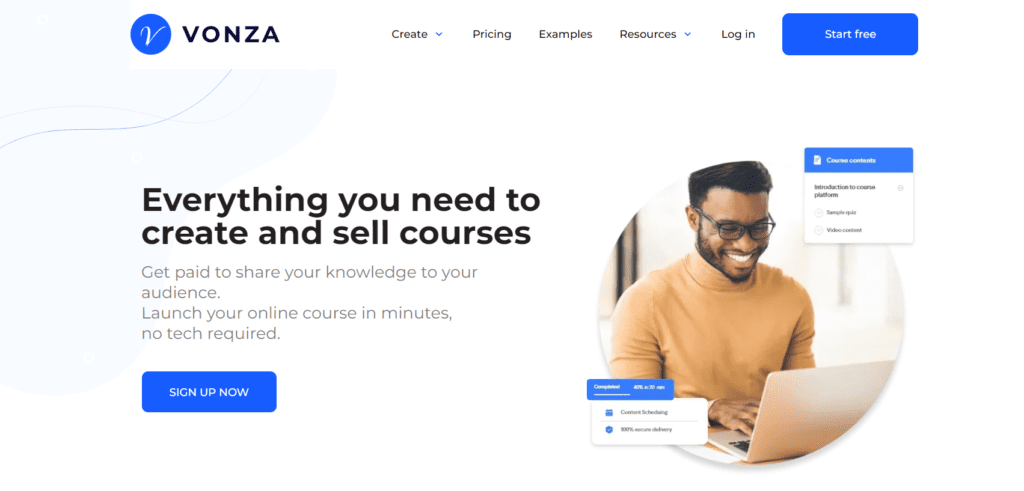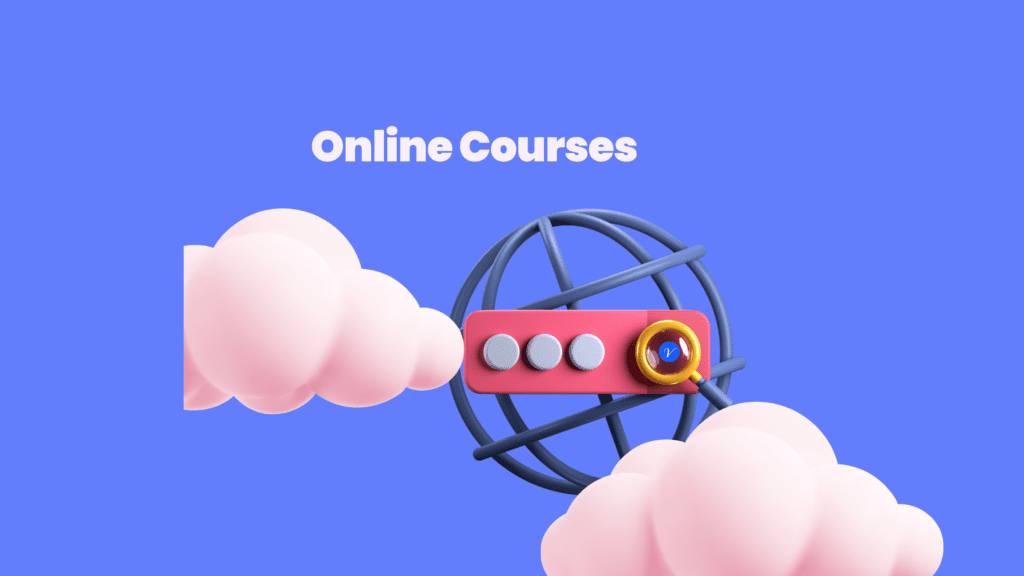Creating and selling online courses has become an increasingly popular way for individuals and businesses to share knowledge and generate income in the digital age. Whether you’re an expert in a specific field or have a unique skill set to offer, designing and launching your own online course can open up a world of opportunities.
In this blog, we will explore 20 effective strategies that can help you create compelling and successful online courses that resonate with your target audience. From content creation to marketing tactics, we’ll delve into various aspects of course development to equip you with the knowledge and tools necessary for a thriving online teaching venture.
So, if you’re ready to dive into the world of online education and make a meaningful impact while earning income, let’s explore these strategies together and set you up for success.

What are Online Courses?
Online courses, also known as e-learning or distance learning courses, are educational programs that are conducted entirely or predominantly over the internet. They allow individuals to acquire knowledge and develop skills without the need to attend physical classrooms or be present at a specific location.
Online courses have gained significant popularity in recent years due to their flexibility, accessibility, and the advancements in digital technology.
Recommended: How to Create a Profitable Online Course with Vonza
Online courses can cover a wide range of subjects and disciplines, including academic subjects, professional skills, personal development, and hobbies. They are typically structured into modules or lessons, and learners can access the course materials, lectures, and assignments through a dedicated online platform or learning management system (LMS).
Benefits of Online Courses
Online courses offer a plethora of benefits for both learners and course creators. In this section, we will explore some of the key advantages that make online courses a valuable educational and business tool.
First and foremost, online courses provide flexibility and convenience that traditional classroom settings often lack. Learners can access course materials and lectures at their own pace and convenience, allowing them to fit learning into their busy schedules. Whether it’s early morning or late at night, learners have the freedom to study whenever it suits them best. This flexibility is particularly beneficial for working professionals, parents, or individuals with other commitments, as it eliminates the need to adhere to rigid class schedules
Furthermore, online courses break down geographical barriers, enabling individuals from all over the world to access high-quality education. Regardless of their location, learners can enroll in courses offered by renowned institutions and industry experts, expanding their knowledge and skills without the need for physical relocation. This accessibility opens up a world of opportunities, particularly for those residing in remote areas or countries with limited educational resources. It promotes inclusivity and provides equal learning opportunities to individuals from diverse backgrounds.
Another significant benefit of online courses is the diverse selection of subjects and topics available. The online learning landscape presents an extensive array of course options, ranging from academic subjects to practical skills. Learners have the opportunity to explore niche subjects and pursue their interests, empowering them to engage in lifelong learning. Whether someone wants to learn a new programming language, improve their photography skills, or delve into ancient history, there is an online course available for virtually any topic.

Additionally, online courses often provide personalized learning experiences. Learners can choose courses that align with their specific goals and learning preferences. They have the freedom to focus on areas they find most challenging, skip content they are already familiar with, and revisit materials as needed. Features such as self-paced learning, interactive quizzes, and personalized feedback allow individuals to tailor their learning journey according to their needs and preferences. This personalized approach enhances the learning experience and increases engagement and retention.
The Global E-learning market is estimated to be worth $388.2 Billion by 2026.
Lastly, online courses tend to be more cost-effective compared to traditional in-person education. Learners can save money on commuting, accommodation, and other expenses associated with attending physical classes. Additionally, online courses often have lower tuition fees, making education more accessible and affordable for a wider audience. This cost-effectiveness allows individuals to acquire new skills and knowledge without significant financial burdens, opening up opportunities for career advancement and personal growth.
20 Effective Strategies in Creating Your Online Courses
1. Identify Your Target Audience
Understanding your target audience is crucial for creating effective online courses. Conduct market research, surveys, or interviews to gather insights into their needs, preferences, and learning goals. By identifying their specific requirements, you can tailor your course content and delivery to meet their expectations.
2. Choose a Compelling Topic
Select a topic that you are passionate about and have expertise in. However, it’s equally important to ensure that the chosen topic has demand in the market. Look for trending subjects, emerging industries, or niche areas that have an audience seeking to acquire knowledge in those areas. Discover the Best 90+ online course ideas you need to know about.

3. Define Learning Objectives
Learning objectives are the specific goals that learners should achieve after completing your course. Clearly define these objectives for each module or lesson. Make them specific, measurable, achievable, relevant, and time-bound (SMART) to provide a clear sense of direction and purpose to your course.
To capture learners’ attention and maintain their engagement, incorporate a variety of content formats. Use videos, slide presentations, infographics, interactive quizzes, and multimedia elements to present information in different ways. This caters to diverse learning styles and keeps learners interested throughout the course.
5. Break Down Lessons into Digestible Units
Divide your course content into logical and manageable units. This helps learners process information more effectively and prevents overwhelming them with too much content at once. Each lesson should focus on a specific topic or concept, building upon previous knowledge and gradually increasing complexity.
6. Incorporate Practical Exercises
Theory alone may not be sufficient for effective learning. Include practical exercises, assignments, or simulations that allow learners to apply the knowledge they have acquired. Practical exercises provide opportunities for active learning, critical thinking, and skill development, making the learning experience more meaningful.

7. Provide Ongoing Assessments
Integrate quizzes, tests, or assignments throughout the course to assess learners’ understanding and progress. These assessments not only measure knowledge retention but also serve as valuable feedback for learners. Provide timely and constructive feedback to help learners identify areas for improvement and reinforce their learning.
8. Offer a Supportive Learning Community
Create a platform or forum where learners can interact with each other and with you as the instructor. Encourage discussions, ask questions, and share insights. This fosters a sense of community and collaboration, enabling learners to learn from their peers and seek support when needed.
9. Provide Timely Feedback
As learners submit assignments or participate in discussions, provide prompt and constructive feedback. This feedback encourages continuous improvement, reinforces learning, and enhances learner engagement and motivation.
10. Utilize Multimedia and Visuals
Visual elements, such as images, diagrams, charts, and videos, can significantly enhance the learning experience. Use visuals to illustrate complex concepts, simplify explanations, and make the content more visually appealing. Well-designed visuals help learners grasp information more easily and improve knowledge retention.
Recommended: Steps to Pre-sell an Online Course
11. Offer Supplementary Resources
Supplement your course content with additional resources like e-books, articles, recommended readings, or external links. These resources allow learners to explore topics in greater depth and cater to their varying levels of interest and curiosity.
12. Implement Gamification Elements
Gamification elements can add a fun and motivational aspect to your online course. Incorporate features like badges, leaderboards, rewards, or progress tracking to incentivize learner engagement and participation. Gamification encourages healthy competition, motivates learners to achieve milestones, and enhances their overall learning experience.
13. Regularly Update Content
Keep your course content up to date to ensure its relevance and value. Monitor industry trends, technological advancements, and feedback from learners to identify areas where updates or improvements are needed. This demonstrates your commitment to providing the most current and valuable content to your learners.
14. Leverage Multimedia Tools
Take advantage of learning management systems (LMS) or content authoring tools specifically designed for online course creation. These tools simplify the process of organizing, delivering, and managing your course content. They often offer features such as progress tracking, discussion forums, and assessment capabilities, streamlining the learning experience for both you and your learners.
15. Seek Learner Feedback
Actively seek feedback from your learners throughout the course. Provide surveys, polls, or feedback forms to gather their opinions, suggestions, and areas of improvement. Analyze this feedback to identify patterns, address concerns, and make necessary adjustments to enhance the overall course experience.

16. Incorporate Real-Life Examples
Use real-life examples, case studies, or scenarios to make the course content more relatable and applicable. Show learners how the concepts they are learning can be applied in practical situations. Real-life examples provide context, deepen understanding, and reinforce the relevance of the course material.
17. Offer Certificates or Recognitions
Upon successful completion of your course, offer learners certificates or badges to acknowledge their achievements. Certificates provide a sense of accomplishment, validate their newly acquired skills, and can be shared on professional platforms or included in resumes. Recognition of their efforts boosts motivation and encourages them to pursue further learning opportunities.
18. Implement a Pricing and Marketing Strategy
Determine an appropriate pricing structure for your course based on factors such as course value, market demand, and competition. Develop a marketing plan to reach your target audience effectively. Utilize social media platforms, email marketing, content marketing, collaborations, or affiliate partnerships to promote your course and attract learners.
19. Continuously Improve and Evolve
Monitor the performance of your course, track learner engagement, and collect data on completion rates, feedback, or success stories. Analyze this data to identify areas for improvement and implement necessary changes. Stay updated with industry trends, teaching methodologies, and technological advancements to enhance your course offerings continually.
20. Engage in Continuous Learning
As an online course creator, invest in your own professional development. Attend webinars, workshops, or conferences related to instructional design, online teaching, or your course topic. Engage in communities or online forums where course creators share best practices and exchange ideas. By continuously learning and staying informed, you can enhance your instructional design skills and deliver high-quality online courses.
Conclusions and Recommendation
In conclusion, creating online courses is an exciting and rewarding endeavor that offers numerous benefits for both learners and course creators. The flexibility and convenience of online learning make education accessible to individuals worldwide, regardless of their location or busy schedules. The diverse selection of course topics allows learners to pursue their interests and acquire knowledge in specialized areas. Personalized learning experiences, interactive content, and practical exercises enhance engagement and facilitate skill development.
When it comes to creating online courses, Vonza is a platform that offers a range of features and tools to support your course creation journey. Vonza is an all-in-one platform designed specifically for course creators, providing a comprehensive solution to build, market, and deliver your online courses.
Vonza provides intuitive course creation tools that allow you to easily organize and structure your course content. You can create engaging multimedia lessons, upload videos, presentations, and documents, and design interactive quizzes and assessments to enhance learner engagement.
Vonza offers pre-designed templates and layouts that you can customize to match your branding and create a visually appealing course. These templates ensure a professional and consistent look throughout your course materials.
With Vonza, you can build a membership site to host and deliver your courses. This allows you to control access to your content and create a dedicated learning environment for your students.
Overall, Vonza offers a comprehensive set of features and tools to simplify the course creation process and support your success as an online course creator. From course creation and marketing to student engagement and analytics, Vonza provides a robust platform to bring your educational vision to life.
As course creators, it is essential to continuously improve and evolve our courses based on learner feedback, industry trends, and advancements in technology. Embracing tools and platforms designed for online course creation streamlines the process, while marketing strategies help reach the intended audience effectively. By staying abreast of developments in the field and engaging in continuous learning, we can refine our instructional design skills and deliver high-quality online courses that meet the evolving needs of learners.
So, whether you’re an expert in a particular field, have a unique skill set, or simply have knowledge to share, embarking on the journey of creating online courses can be a fulfilling and transformative experience. Embrace the effective strategies outlined in this blog, harness the power of technology, and embark on your path to creating compelling and successful online courses. Your expertise has the potential to inspire, educate, and empower learners on their educational journey in the digital age.
Start enjoying the benefits of using Vonza to build a money-making course by signing up today.

